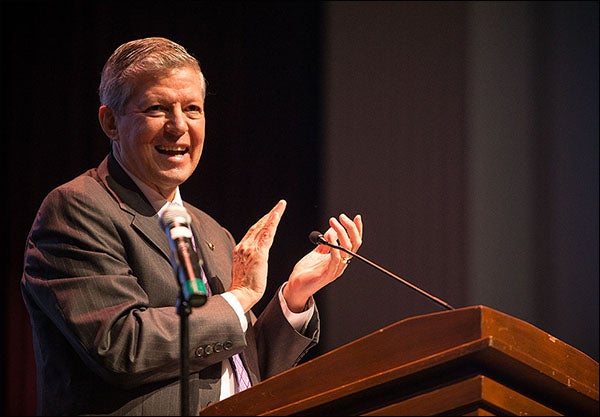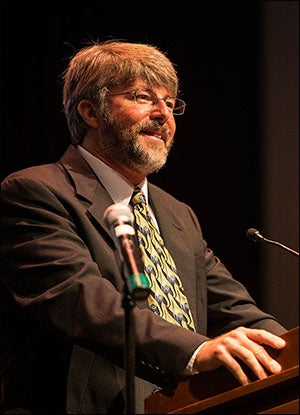‘A VERY DIFFERENT FUTURE’
Budget questions, decisions part of new academic year

ECU Chancellor Steve Ballard discussed the university’s future in light of ongoing budget cuts at the fall 2013 Faculty Convocation Aug. 19. (Photos by Cliff Hollis)
During his 10th address at the annual faculty convocation, Chancellor Steve Ballard told East Carolina University faculty to expect budget decisions to be a continuing part of the academic year that begins today. “We will be more challenged fiscally than other years,” he said.
“If there is any good news to this budget, I suppose it would be that ECU took one of the smaller percentage cuts in the UNC system,” Ballard said Aug. 19 during the annual assembly in Wright Auditorium. At 3.68 percent, ECU’s budget cut is the smallest of the system’s three largest campuses, the chancellor said.
ECU’s more than $10 million in budget cuts this year “will hurt the student experience, they will reduce academic quality, and they will reduce our ability to train teachers, prepare nurses and provide a health care safety net,” Ballard said.
A new University Committee on Fiscal Sustainability will begin meeting in coming days to recommend ways the campus can generate more revenue, especially from enrollment, and to continue reducing administrative costs, he said.
“We must take a long-term perspective and we must do business differently,” Ballard said. “We have no choice, other than to gradually reduce the quality of every program. I’m unwilling to take that approach.”
UNC campuses, which traditionally were funded by the state based on enrollment, now are evaluated by how well they serve students. State appropriations are based in part on freshman-to-sophomore student retention, graduation rates, degree efficiency and compliance with new system-wide accounting principles.
ECU succeeded in three of those four measures last academic year. It failed to meet its goal for degree efficiency, which measures how many students graduate in a timely manner. Thus, its budget cuts were smaller than other campuses that didn’t do as well on those yardsticks.
“If we would have missed our (freshmen to sophomore) retention goal, say by 0.1 percent, it would have cost us over $1 million” in additional cuts, Ballard said.
He said his first priority for the year “is to prepare for a very different future, one in which declining state support for higher education is almost a given.”
As the campus looks for even more ways to tighten its belt, “we must be bold in our approach, driven by our values and mission, and committed to delivering on the promise of opportunity,” said Ballard.
“Numerous other provisions (in the new state budget) are onerous and some are directly targeting the Brody School of Medicine,” Ballard said. Policy changes reduce the ability of the medical school and its associate practices to collect debt from patients who owe money. Changes in Medicaid rules also impede the medical school’s ability to be reimbursed at rates similar to what commercial insurance would pay for the same service.
“We have some tough times ahead,” Ballard concluded, “but we will emerge on the other side with a vital mission and with our quality intact.”
Ballard pointed out that East Carolina achieved many accomplishments in the past year despite difficult budget times, including at least one high-profile national award for engagement. Those accomplishments included:
- Dr. Sam Sears in the department of psychology and the East Carolina Heart Institute won the O. Max Gardner award for faculty excellence from the University of North Carolina Board of Governors, the most prestigious award given by the UNC system.
- The Lucille Gorham Intergenerational Center, a partnership between ECU, the West Greenville community, the city of Greenville and Pitt Community College, won the national Peter McGrath award from the Association of Public and Land Grant Universities.
- The Honors College, launched in 2001, now has nearly 400 students enrolled and continues to be a “game-changer” for the university as one of its strongest academic programs. Dr. Marianna Walker is its new dean.
- The Brody School of Medicine was rated No. 1 in the nation for family medicine by the American Academy of Family Physicians. In addition, Dean Paul Cunningham, was recognized with the Presidential Award for his achievements.
- Dr. Marti Engelke, professor and dean in the College of Nursing, will be inducted as a fellow in the American Academy of Nursing in October, the most prestigious honor in the field of nursing.
- Provost Marilyn Sheerer secured a $2.3 million grant from the State Employees Credit Union Foundation to continue the Partnership East program, which prepares residents of rural communities to become teachers in those communities.

Faculty Senate president Mark Sprague urged faculty to focus on student success during the annual Faculty Convocation Aug. 19.
Faculty Senate President Mark Sprague, who is in the second year of his two-year term, noted that this is the 50th anniversary of the university’s system of shared governance. The Faculty Senate was created in early 1964.
Sprague urged faculty members to shift their focus from state budget cuts to the academic success of students. “We must demonstrate (to the legislature) that we are worth the investment,” he said.
Also speaking at the kick-off for the academic year was Dr. John Stiller, the recipient of the UNC Board of Governors Teaching Award for 2012-13. He spoke of his love of bringing creativity in teaching biology, especially in the introduction courses in his discipline.
“Try to think as creatively in your teaching as you do in your research and creative work,” he suggested to his colleagues.